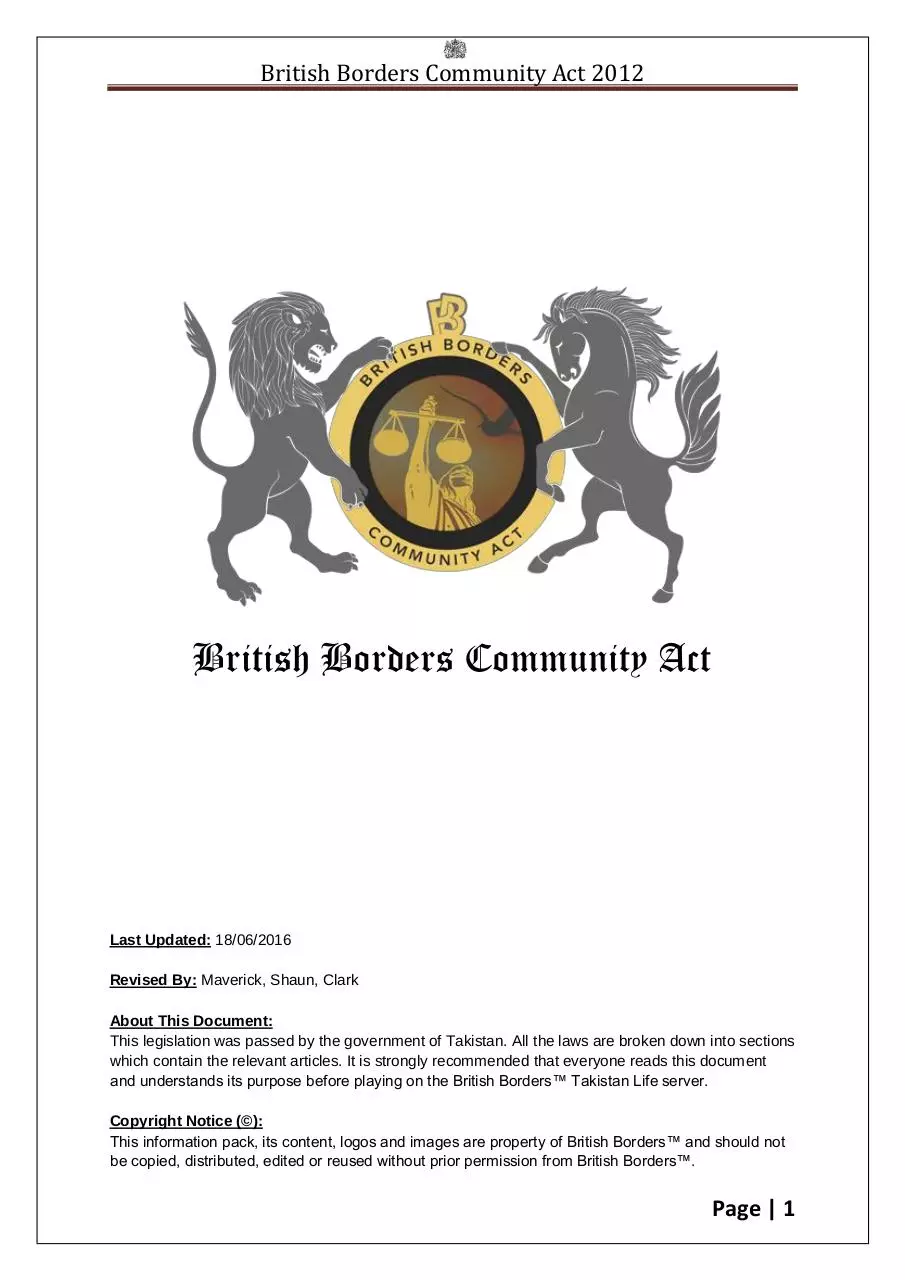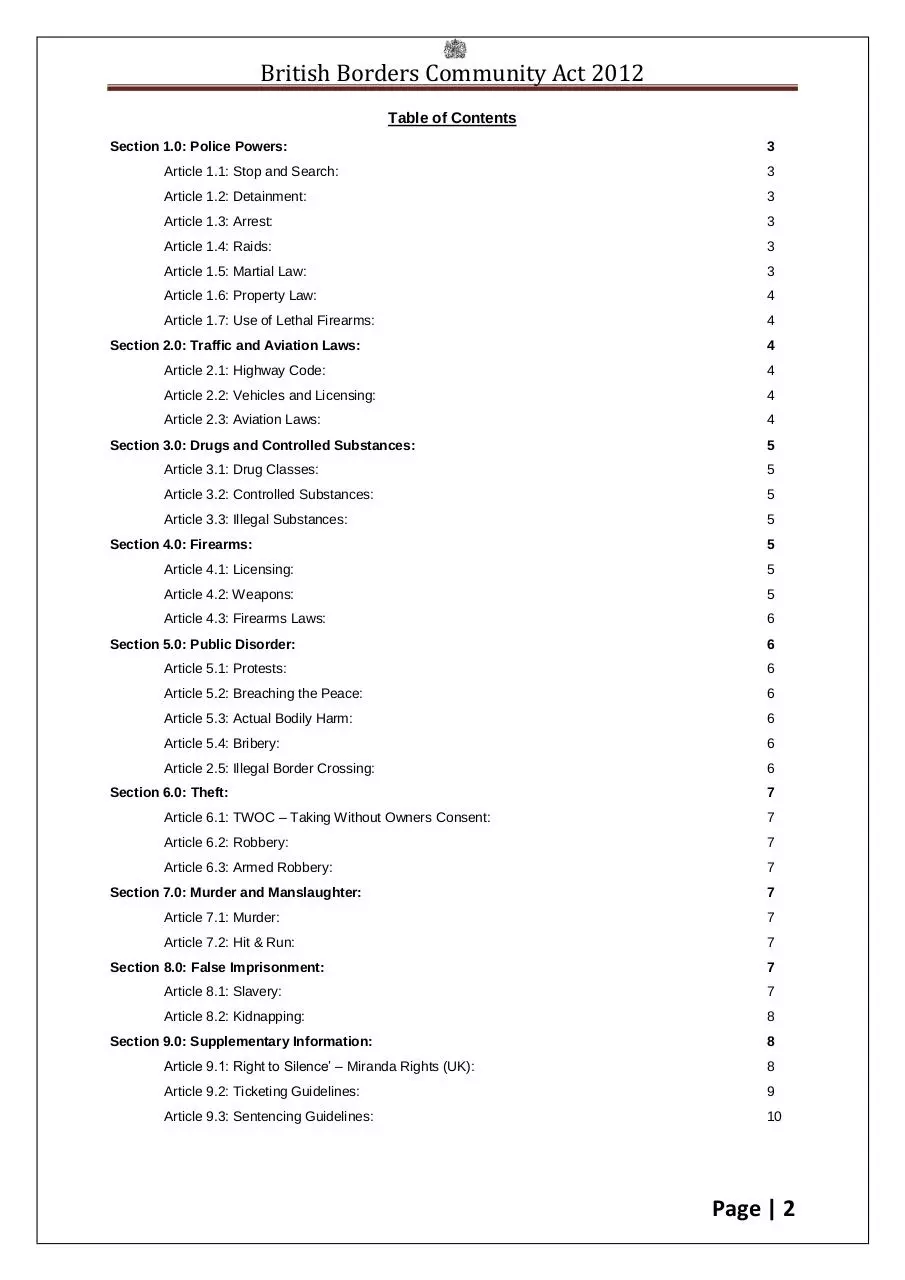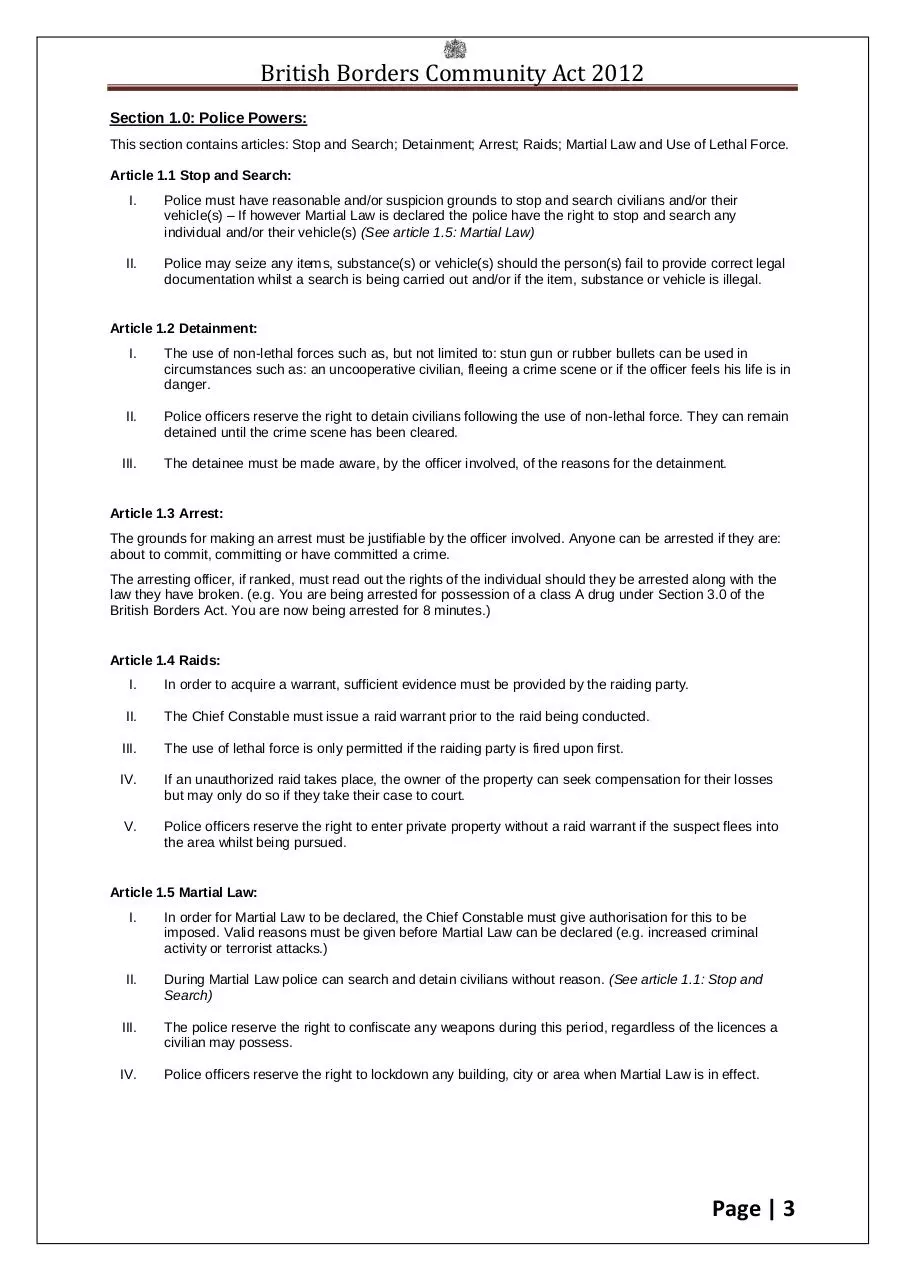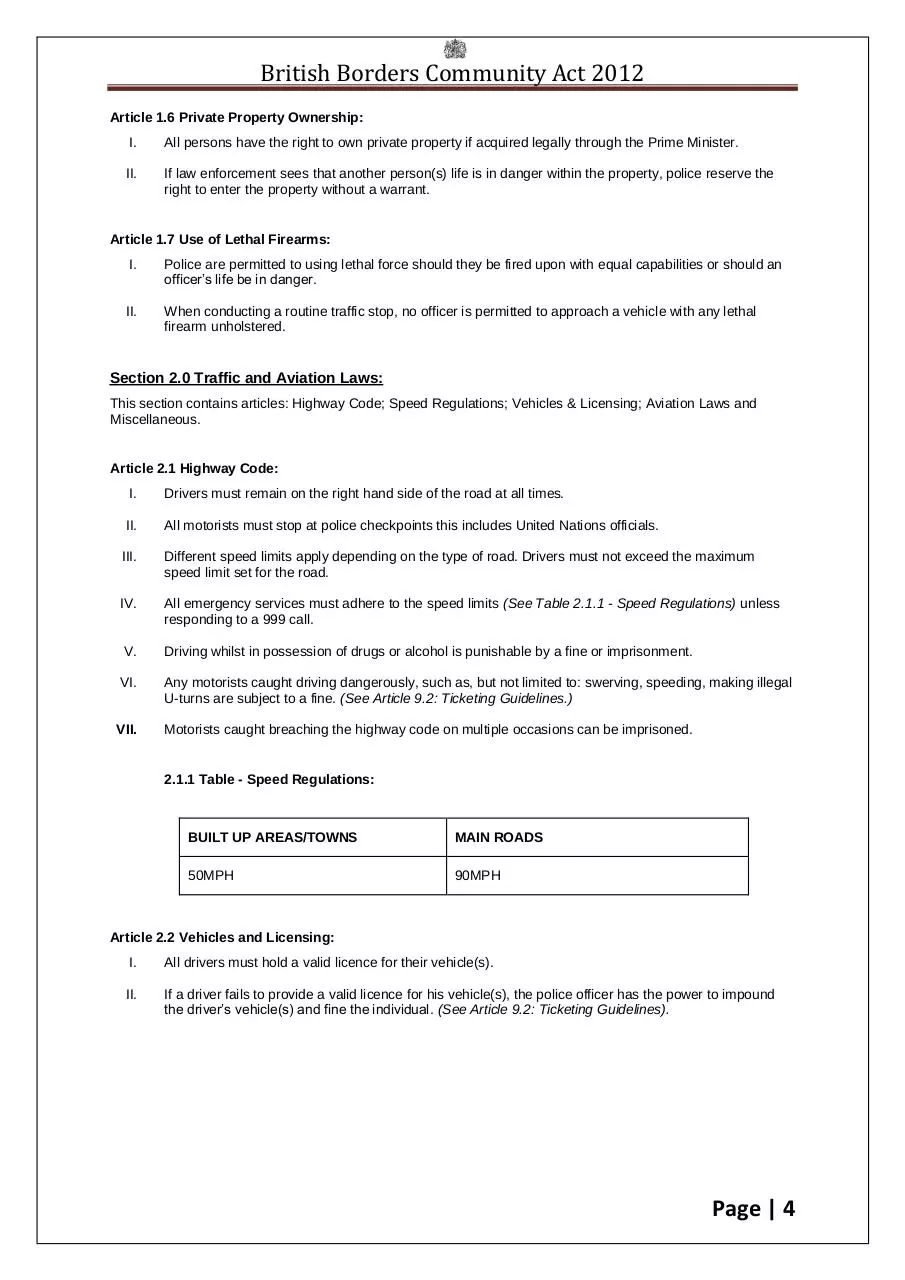British Borders Community Act June 2016 (PDF)
File information
Author: Owner
This PDF 1.5 document has been generated by Microsoft® Word 2010, and has been sent on pdf-archive.com on 21/06/2016 at 01:47, from IP address 86.161.x.x.
The current document download page has been viewed 561 times.
File size: 595.93 KB (10 pages).
Privacy: public file





File preview
British Borders Community Act 2012
British Borders Community Act
Last Updated: 18/06/2016
Revised By: Maverick, Shaun, Clark
About This Document:
This legislation was passed by the government of Takistan. All the laws are broken down into sections
which contain the relevant articles. It is strongly recommended that everyone reads this document
and understands its purpose before playing on the British Borders™ Takistan Life server.
Copyright Notice (©):
This information pack, its content, logos and images are property of British Borders™ and should not
be copied, distributed, edited or reused without prior permission from British Borders™.
Page | 1
British Borders Community Act 2012
Table of Contents
Section 1.0: Police Powers:
3
Article 1.1: Stop and Search:
3
Article 1.2: Detainment:
3
Article 1.3: Arrest:
3
Article 1.4: Raids:
3
Article 1.5: Martial Law:
3
Article 1.6: Property Law:
4
Article 1.7: Use of Lethal Firearms:
4
Section 2.0: Traffic and Aviation Laws:
4
Article 2.1: Highway Code:
4
Article 2.2: Vehicles and Licensing:
4
Article 2.3: Aviation Laws:
4
Section 3.0: Drugs and Controlled Substances:
5
Article 3.1: Drug Classes:
5
Article 3.2: Controlled Substances:
5
Article 3.3: Illegal Substances:
5
Section 4.0: Firearms:
5
Article 4.1: Licensing:
5
Article 4.2: Weapons:
5
Article 4.3: Firearms Laws:
6
Section 5.0: Public Disorder:
6
Article 5.1: Protests:
6
Article 5.2: Breaching the Peace:
6
Article 5.3: Actual Bodily Harm:
6
Article 5.4: Bribery:
6
Article 2.5: Illegal Border Crossing:
6
Section 6.0: Theft:
7
Article 6.1: TWOC – Taking Without Owners Consent:
7
Article 6.2: Robbery:
7
Article 6.3: Armed Robbery:
7
Section 7.0: Murder and Manslaughter:
7
Article 7.1: Murder:
7
Article 7.2: Hit & Run:
7
Section 8.0: False Imprisonment:
7
Article 8.1: Slavery:
7
Article 8.2: Kidnapping:
8
Section 9.0: Supplementary Information:
8
Article 9.1: Right to Silence’ – Miranda Rights (UK):
8
Article 9.2: Ticketing Guidelines:
9
Article 9.3: Sentencing Guidelines:
10
Page | 2
British Borders Community Act 2012
Section 1.0: Police Powers:
This section contains articles: Stop and Search; Detainment; Arrest; Raids; Martial Law and Use of Lethal Force.
Article 1.1 Stop and Search:
I.
Police must have reasonable and/or suspicion grounds to stop and search civilians and/or their
vehicle(s) – If however Martial Law is declared the police have the right to stop and search any
individual and/or their vehicle(s) (See article 1.5: Martial Law)
II.
Police may seize any items, substance(s) or vehicle(s) should the person(s) fail to provide correct legal
documentation whilst a search is being carried out and/or if the item, substance or vehicle is illegal.
Article 1.2 Detainment:
I.
The use of non-lethal forces such as, but not limited to: stun gun or rubber bullets can be used in
circumstances such as: an uncooperative civilian, fleeing a crime scene or if the officer feels his life is in
danger.
II.
Police officers reserve the right to detain civilians following the use of non-lethal force. They can remain
detained until the crime scene has been cleared.
III.
The detainee must be made aware, by the officer involved, of the reasons for the detainment.
Article 1.3 Arrest:
The grounds for making an arrest must be justifiable by the officer involved. Anyone can be arrested if they are:
about to commit, committing or have committed a crime.
The arresting officer, if ranked, must read out the rights of the individual should they be arrested along with the
law they have broken. (e.g. You are being arrested for possession of a class A drug under Section 3.0 of the
British Borders Act. You are now being arrested for 8 minutes.)
Article 1.4 Raids:
I.
In order to acquire a warrant, sufficient evidence must be provided by the raiding party.
II.
The Chief Constable must issue a raid warrant prior to the raid being conducted.
III.
The use of lethal force is only permitted if the raiding party is fired upon first.
IV.
If an unauthorized raid takes place, the owner of the property can seek compensation for their losses
but may only do so if they take their case to court.
V.
Police officers reserve the right to enter private property without a raid warrant if the suspect flees into
the area whilst being pursued.
Article 1.5 Martial Law:
I.
In order for Martial Law to be declared, the Chief Constable must give authorisation for this to be
imposed. Valid reasons must be given before Martial Law can be declared (e.g. increased criminal
activity or terrorist attacks.)
II.
During Martial Law police can search and detain civilians without reason. (See article 1.1: Stop and
Search)
III.
The police reserve the right to confiscate any weapons during this period, regardless of the licences a
civilian may possess.
IV.
Police officers reserve the right to lockdown any building, city or area when Martial Law is in effect.
Page | 3
British Borders Community Act 2012
Article 1.6 Private Property Ownership:
I.
All persons have the right to own private property if acquired legally through the Prime Minister.
II.
If law enforcement sees that another person(s) life is in danger within the property, police reserve the
right to enter the property without a warrant.
Article 1.7 Use of Lethal Firearms:
I.
Police are permitted to using lethal force should they be fired upon with equal capabilities or should an
officer’s life be in danger.
II.
When conducting a routine traffic stop, no officer is permitted to approach a vehicle with any lethal
firearm unholstered.
Section 2.0 Traffic and Aviation Laws:
This section contains articles: Highway Code; Speed Regulations; Vehicles & Licensing; Aviation Laws and
Miscellaneous.
Article 2.1 Highway Code:
I.
Drivers must remain on the right hand side of the road at all times.
II.
All motorists must stop at police checkpoints this includes United Nations officials.
III.
Different speed limits apply depending on the type of road. Drivers must not exceed the maximum
speed limit set for the road.
IV.
All emergency services must adhere to the speed limits (See Table 2.1.1 - Speed Regulations) unless
responding to a 999 call.
V.
Driving whilst in possession of drugs or alcohol is punishable by a fine or imprisonment.
VI.
Any motorists caught driving dangerously, such as, but not limited to: swerving, speeding, making illegal
U-turns are subject to a fine. (See Article 9.2: Ticketing Guidelines.)
VII.
Motorists caught breaching the highway code on multiple occasions can be imprisoned.
2.1.1 Table - Speed Regulations:
BUILT UP AREAS/TOWNS
MAIN ROADS
50MPH
90MPH
Article 2.2 Vehicles and Licensing:
I.
All drivers must hold a valid licence for their vehicle(s).
II.
If a driver fails to provide a valid licence for his vehicle(s), the police officer has the power to impound
the driver’s vehicle(s) and fine the individual. (See Article 9.2: Ticketing Guidelines).
Page | 4
British Borders Community Act 2012
Article 2.3 Aviation Laws:
I.
All pilots must hold a valid air license.
II.
No aircraft is permitted to fly below 200 meters unless the aircraft in operation is being landed at an
airfield or designated landing zone.
III.
If Martial Law is in place (See Article 1.5: Martial Law) police/military air vehicles are permitted to fly
below the minimum flight level of 200 meters.
If an aircraft is flying in restricted airspace or breaking aviation laws, the aircraft risks being shot down authorisation for such an act must be granted from the Chief Constable.
IV.
Article 2.4 Miscellaneous:
I.
The Police reserve the right to seize, impound or destroy any vehicle obtained from the Terrorist Base.
II.
Any civilian operating a terrorist vehicle is subject to arrest for possession of an illegal weapon. (See
Article 9.3: Sentencing Guidelines).
Section 3.0 Drugs and Controlled Substances:
This section contains articles: Drug Classes; Controlled Substances and Illegal Substances.
Article 3.1 Drug Classes:
I.
All drugs in Takistan are illegal substances and are ranked in the table below.
II.
Being in possession of any of these substances is a heavily punishable offense (See Article 9.3:
Sentencing Guidelines)
3.1.1 Table - Drug Classes:
CLASS A
CLASS B
CLASS C
Heroin, Cocaine
LSD, Cannabis
Alcohol
Article 3.2 Controlled Substances:
I.
The drugs listed in class C (See Table 3.1.1: Drug Classes) are legal substances and should be taken
with caution. Excessive use of these substances can result in fines.
II.
All alcohol must be consumed within a 50 metres radius of a public house.
III.
Driving in the possession of alcohol. (See Article 2.1: Highway Code)
Article 3.3 Illegal Substances:
I.
Possession of class A drugs (See Table 3.1.1: Drug Classes) will result in imprisonment.
II.
Possession of class B drugs (See Table 3.1.1: Drug Classes) can result in a fine or imprisonment. A fine
can be issued if the person stopped has 10 grams (units) or less. (See Article 9.2: Ticketing Guidelines)
Section 4.0 Firearms:
This section contains articles: Licensing; Weapons and Firearm Laws.
Page | 5
British Borders Community Act 2012
Article 4.1 Licensing:
I.
All those who wish to obtain a firearm must hold the corresponding license.
II.
If a civilian fails to provide correct documentation, all firearms belonging to that individual(s) will be
seized by the police and a fine will be issued. (See Article 9.2: Ticketing Guidelines)
Article 4.2 Weapons:
I.
If a civilian is found to be in possession of a firearm belonging to law enforcement services, the police
reserve the right to confiscate the weapon and arrest the individual.
II.
All firearms purchased from the Terrorist Base, those that represent an AK model (i.e from weapon
factory) or a PDW obtained from a gang area are illegal and will be seized by the police. (See article
4.1: Licensing)
Article 4.3 Firearms Laws:
I.
All civilians who are in possession of a firearm must keep it holstered at all times.
II.
Those with a valid PMC Licence are permitting to carrying their firearm unholstered when operating on a
contract.
Section 5.0 Public Disorder:
This section contains articles: Protests; Anti-Social Behaviour; Grievous Bodily Harm; Bribery and Illegal
Border Crossing.
Article 5.1 Protests:
I.
Civilians have the right to protest peacefully.
II.
Any civilians suspected of trying to start riots can be detained, removed from the area and fined or
imprisoned - Rioting includes, but is not limited to, throwing rocks and setting cars on fire. (See Article
9.2: Ticketing Guidelines)
Article 5.2 Breaching the Peace:
I.
All civilians have the right to free speech and freedom of thought.
II.
Civilians who are causing a disturbance by: persistently shouting abuse or obscenities or otherwise
acting in a disorderly manner in a group or individually can be fined by the police. (See Article 9.2:
Ticketing Guidelines)
III.
Obstructing or blocking areas with right of access, including roads or public footpaths, with the intention
to disturb or stop other persons from freely moving could result in a fine being issued. (See Article 9.2:
Ticketing Guidelines)
IV.
The police reserve the right to issue a Section 5 order which would restrict or forbid access, of an
individual and/or their property, of entering a certain area for a maximum of 20 minutes.
V.
Those who damage or destroy another person’s property can be issued with a fine for criminal damage.
(See Article 9.2: Ticketing Guidelines)
Article 5.3 Actual Bodily Harm:
I.
An assault is committed when a civilian intentionally or recklessly causes harm, damages or injury using
unlawful force.
II.
A civilian, who has been the victim of an assault, has the right to defend them self with reasonable force
(Killing them is not acceptable and will be classed as Manslaughter.)
Page | 6
British Borders Community Act 2012
Article 5.4 Bribery:
I.
If a civilian is found to be offering currency or items with the intent to unlawfully change the outcome of
an arrest or ticket, the police then reserve the right to further add a sentence of bribery.
II.
Bribery is not limited to law enforcement. Any interaction between a person that involves bribery to
pervert the course of justice can also be subject to sentencing for bribery.
Article 5.5 Illegal Border Crossing:
I.
Crossing the border without a valid passport is illegal and can result in jail unless explicitly stated
otherwise by the United Nations. This can include, but is not limited to, operating an open border policy.
Section 6.0 Theft:
This section contains articles: TWOC; Robbery and Armed Robbery.
Article 6.1 TWOC – Taking Without Owners Consent:
I.
Drivers must be able to provide valid documentation for their vehicle. (See Article 2.2 – Vehicles and
Licencing.)
II.
Should the registration of a vehicle be invalid, fail to match or if the driver is unable to prove ownership
of a vehicle, the police reserve to right to seize the vehicle and arrest the driver.
Article 6.2 Robbery:
I.
The act of stealing, and immediately before or at the time of doing so, using force to put a civilian in fear
and to obtain their personal belongings.
II.
By robbing an individual(s) and/or their personal belongings will result in a jail sentence. (See Article
9.3: Sentencing Guidelines)
Article 6.3 Armed Robbery:
I.
Armed robbery involves a planned operation with the intention to steal money or goods using a firearm
or lethal force. (This includes: Supermarket/ Gas Station/ Bank/ Casino Robbery.)
II.
Civilians involved in committing or attempting to commit armed robbery will be imprisoned.
Section 7.0 Murder and Manslaughter:
This section contains articles: Murder and Hit & Run.
Article 7.1 Murder:
I.
Every civilian has the right to life. Those who, by accident or intention, end the life of another civilian will
be jailed.
II.
In contrast to the offence of murder, attempted murder requires the existence of an intention to kill, not
merely to cause actual bodily harm.
Article 7.2 Hit & Run:
I.
When driving: by hitting; injuring or killing another will result in the driver being arrested and imprisoned.
Page | 7
British Borders Community Act 2012
Section 8.0 False Imprisonment:
This section contains articles: Slavery and Kidnap
Article 8.1 Slavery:
I.
Every civilian has the right to life and should not be subject to inhumane treatment.
II.
The hiring and use of slaves is a criminal offence and is punishable by imprisonment.
Article 8.2 Kidnapping:
I.
Involves infringing on a civilian’s liberty, consisting of the taking or carrying away of another civilian
without their consent.
II.
Those involved in kidnapping another civilian will be sentenced to jail. (See Article 9.3: Sentencing
Guidelines)
Section 9.0 Supplementary Information:
I.
This section outlines the fine and compensation that can/must be given to civilians and/or the jail
sentence depending on the offence committed.
II.
If a civilian has committed multiple crimes, then jail sentences may be issued. Maximum jail sentence is
18 minutes.
Article 9.1 ‘Right to Silence’ – Miranda Rights (UK):
In England and Wales, the police make the following statement when arresting a person:
"You do not have to say anything, but it may harm your defence if you do not mention when questioned
something which you later rely on in court. Anything you do say may be given in evidence."
It is compulsory that all ranked officers use the above statement in accordance with Section 1: Police Powers;
Article 3: Arrest.
END OF PAGE
GUIDELINES ARE ON THE FOLLOWING PAGE
Page | 8
British Borders Community Act 2012
Article 9.2: Ticketing Guidelines:
Offence
Fine
Breach of Highway Code (Includes driving off road, speeding, illegal uturn’s, driving on the wrong side of the road, failure to follow road sign
instructions.)
£500
Illegal parking
£250
Driving without a licence.
£1000 + Vehicle
Impounded
Flying without a licence.
£4000
Driving whilst in possession of alcohol
£500 + Vehicle Impounded +
Alcohol Removed
Flying in restricted airspace and/or exceeding the Minimum Flight Level
(200ft)
£2500
Rioting (Includes, but is not limited to, throwing rocks and setting cars on
fire.)
£3000
Public disorder (Including. swearing, verbal abuse etc.)
£350
Possession of an unlicensed Firearm
£1250 + Firearm(s) Seized
Perverting the course of justice (The act of obstructing the police or
withholding evidence to enable the police to carry out their duties.)
£2000
Possession of an illegal item. (Items include: lighters; lock picks and zipties.)
£1000
Possession of a Class B drugs (10 grams [units] or less)
£2500
Criminal Damage (Includes: destroying road signs, walls and buildings or
ramming another person’s vehicle intentionally,)
£500
Trespassing (By means of entering a restricted area or private property.
This includes: Cop base, UN Base, SCO19 Base and the Jail drop off
area.)
£1000
Page | 9
Download British Borders Community Act June 2016
British Borders Community Act June 2016.pdf (PDF, 595.93 KB)
Download PDF
Share this file on social networks
Link to this page
Permanent link
Use the permanent link to the download page to share your document on Facebook, Twitter, LinkedIn, or directly with a contact by e-Mail, Messenger, Whatsapp, Line..
Short link
Use the short link to share your document on Twitter or by text message (SMS)
HTML Code
Copy the following HTML code to share your document on a Website or Blog
QR Code to this page

This file has been shared publicly by a user of PDF Archive.
Document ID: 0000391373.